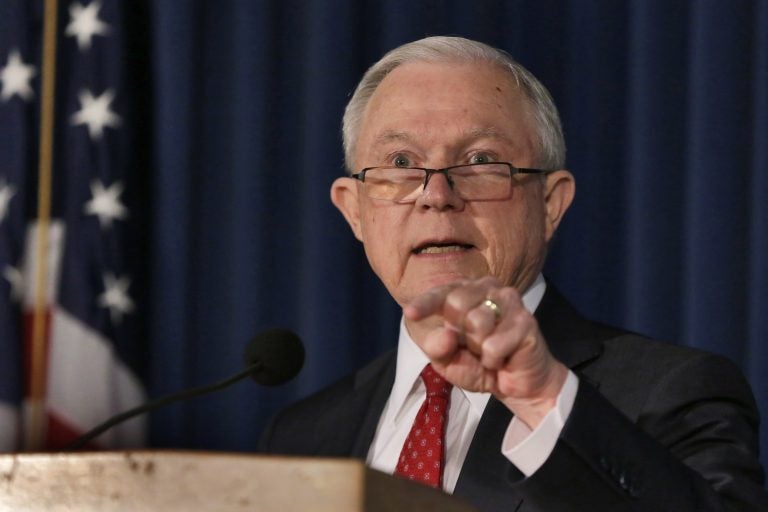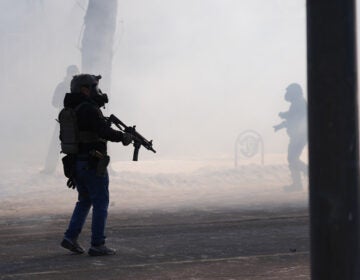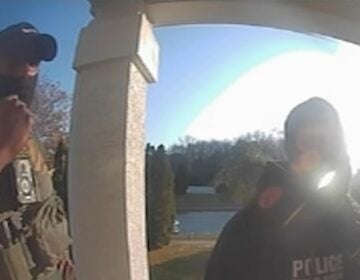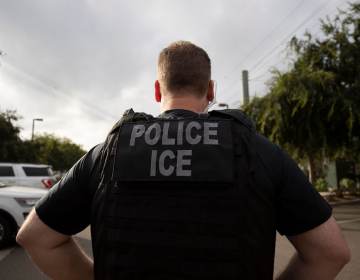Federal judge tips hand in dispute between Philly, DOJ over ‘sanctuary city’ sanctions
Ruling expected soon on whether Trump administration can withhold grant money in retaliation for city shielding immigrants from ICE agents.

U.S. Attorney General Jeff Sessions delivers remarks about defending national security, at the U.S. Attorney's Office for the Southern District of New York, Thursday, Nov. 2, 2017. (Richard Drew/AP Photo)
The judge overseeing the standoff between the Department of Justice and Philadelphia city officials is expected to rule soon on whether Attorney General Jeff Sessions can withhold grant funding because the city limits cooperation with immigration agents.
And U.S. District Judge Michael Baylson on Thursday clearly indicated where his sympathies lie.
“Your letter is wrong,” said Baylson, referring to a notice Justice officials sent to the city describing how Sessions’ new grant requirements were not being followed. “You don’t pay attention to what’s going on in Philadelphia.”
The court fight between federal and city government emerged after Philadelphia sued the Justice Department in August following new strings Sessions sought to attach to public safety grants administered through the Edward Byrne Memorial Justice Assistance program.
Among the new conditions were that U.S. Immigration and Customs Enforcement officials be given a two-day notice before an immigrant suspected of being in the country illegally is released from local custody. The Trump administration additionally asked that Philadelphia let federal immigration agents have unlimited access to city jails, even though, as Baylson noted, just 17 percent of those in city jails have been convicted of a crime.
Philly limits cooperation with ICE
On the line for the city: $1.6 million in federal support, which city officials say is needed to help Philadelphia police officers fight the opioid crisis by equipping them with the overdose-reversing drug naloxone, also known as Narcan. It’s a tiny chunk of Philadelphia’s $4 billion city budget, but fighting to maintain current protections for immigrants has become an important political battle for Mayor Jim Kenney. City leaders from 23 other jurisdictions, including Pittsburgh and New York, have filed friend of the court briefs to support Philadelphia’s position.
Without ICE agents’ unfettered access to immigrant inmates, DOJ officials contend, violent offenders could be roaming free.
“There are a lot of federal grants with strings attached,” said DOJ lawyer Chad Readler at Thursday’s hearing. “If you don’t like the strings, the city won’t get the grant.”
In Chicago, a federal judge has issued a nationwide block on two of the three new grant conditions, saying federal officials exceeded their authority by imposing the new rules. Justice lawyers are appealing in hopes that the injunction will only apply in Chicago.
Sarah Solow, a private attorney who argued on behalf of the city, told Baylson that justifying the new conditions as legal followed a “tortured reading” of existing laws.
“There’s no authority to do it,” Solow said. “It’s just something the attorney general has put in there.”
Under city policy, the only time officials hand off someone leaving custody to ICE agents is if the request is accompanied with a arrest warrant signed by a judge, or if the person in question has been convicted of a serious felony.
Since 2015, ICE has asked that city officials detain suspects 140 times, but only four of those requests included a judicial warrant.
The city does not honor ICE agent requests made administratively, or even detainer requests initiated by immigration judges.
Judge: City in ‘substantial compliance’ with DOJ conditions
Baylson said the city’s policy of turning over violent criminals who are in the country illegally to federal immigration officials is proof that the “sanctuary city” label is a “total misnomer.”
It’s something DOJ lawyers strongly dispute, and the government’s crackdown on sanctuary cities is an attempt to allow authorities to investigate not just criminal immigrants, but law-breakers whose violations are technical.
Even though less than 3 percent of the 11 million unauthorized immigrants in the U.S. have committed felonies, the Trump administration has underscored that merely being in the country with lapsed status is illegal.
So all unauthorized people living in the country are potentially “criminal aliens,” according to DOJ officials, who said on Thursday that policies like those found in Philadelphia hamper their investigations.
Baylson said many millions of unauthorized immigrants have just overstayed a visa and that turning them over to ICE would undercut decades-old deportation priorities.
“As far as I can tell, it has never been the policy of the federal government to initiate removal proceedings of visa over-stayers,” Baylson said. “It’s never been enforced since World War II.”
And though DOJ lawyers insisted that the city is blocking access to information about inmates, such as exact release dates, Baylson reminded Readler that “the prison population of Philadelphia is available to ICE day in, day out.”
Last week, Police Commissioner Richard Ross testified that not inquiring about someone’s immigration status assists the city in solving crimes and encourages victims to come forward. And Philadelphia Health Commissioner Tom Farley told the judge that keeping the immigration status of sick people confidential aids public health officials in controlling the spread of disease.
Baylson asked both sides to file supplemental court papers about their legal arguments, yet he was quick to highlight one point about the new grant requirements before leaving the bench.
“The city is in substantial compliance with these conditions,” he said.
WHYY is your source for fact-based, in-depth journalism and information. As a nonprofit organization, we rely on financial support from readers like you. Please give today.




